My cold symptoms had steadily worsened
during the evening and early night, reaching a sort of nadir by around 02:30.
From then on I was able to get some sleep (as could poor Julie!) and by the
morning I felt considerably better, with nothing but the horrible aftermath of
a cold to deal with.
We had a slow, lazy start to the day and it
wasn’t until about 10:00 that we were ready to go sightseeing. This apartment
is extremely well placed for that, being in the centre of a city that is not
huge and the Tourist Information office was only some 250m away from us, which
made it our first point of call. The very helpful young ladies made some
suggestions as to how we might get a taste of the city and speaking of taste,
they even recommended a restaurant to us. The first item on the agenda, at
11:45, was a free guided tour of the city. Now for ‘free’ read no charge but the
guide relies upon voluntary tips for his or her efforts as the sole basis for
their income so of course, one tips very generously. As we had an hour or so,
we went to have a look at the nearby very impressive parish church of St
Stanislaus.
We also went here with our guided tour and this is what we gleaned:
Poland used to be an entirely Catholic country but after the reformation and
the rise of Protestantism, there was a shift in allegiance in the population
towards this new movement. Mother Church didn’t like this so in order to
counter this trend, they called in the Jesuits and their solution was to build
the grandest church they could, almost out-baroquing Baroque! It certainly is
lush, there isn’t a square inch that hasn’t been decorated somehow and the huge
marble pillars are very impressive, particularly so as they aren’t marble, they
are stucco with small bits of marble ground into the plaster mixture. Moreover,
the plentiful gold is actually gold paint, but the effect is just the same.
Once we’d had our fill of the church it was
coffee time and we chose a café in the city square, close to the Renaissance
town hall and where we were due to meet our guide. Maciej. One of the features
of the town hall is that it has a clock – nothing unusual there but the nice
thing about this one is that when it chimes at 12:00, two billy goats come out
and begin to butt one another.
Maciej’s tour commenced at 11:45, time enough
for him to settle the group down before the chimes and to tell us one of his
anecdotes. Legend has it that the goats were about to be slaughtered for a
feast when they escaped and ran up into the tower. When they were cornered at
the very top, their pursuers saw that the city was on fire and they were able
to warn its people and Poznań was saved. The butting goats are to commemorate
this event – I don’t know whether the originals survived the night or whether
they met their intended fate!
The centre of Poznań suffered terribly
during WW2, the majority of its’ buildings were either destroyed or damaged
severely. However the reconstruction has been extremely clever and to the
untutored eye it looks entirely authentic. For instance there is a nice row of
medieval-looking houses which are very narrow and with the ground floor entered
via series of porticoes. However, behind the façade there are perfectly
normally proportioned rooms. There is also a castle nearby, only completed 15
years ago but looks like a recently renovated older building.
I know it sounds
a bit naff but believe me the overall impression of the city was a very
pleasing one and we were very happy indeed with the tour.
As the apartment was not a million miles
away we went there for lunch, buying fresh and very good bread rolls from the
supermarket across the street from us. That afternoon we planned to go to have
a look at the cathedral, have an early drink and go to the restaurant that the
Tourist Information Office recommended, called Hyćka. We therefore didn’t leave
the apartment until 4ish and set off in search of said cathedral, which was
some 15 minutes’ walk away across the river Warta and on an island.
Unlike the baroque church we visited that
morning, the cathedral was much more to our taste, a sort of cross between
Scandinavian austerity and more ornate churches. It was a very impressive
building, one which photographs do no real justice to. From there we went in
search of a mural, mentioned in the guide and hopefully, my photo does show it
quite well.
From there we went in search of the restaurant, which it transpired
was only around the corner. It looked very nice and the two young waitresses we
spoke to were charming and friendly, so we promised to come back later. It was
really too early to go to a bar and anyway we weren’t hungry and didn’t fancy
an early meal so instead we went back to the apartment, to return to Hyćka at
19:30.
Hyćka specializes in Polish cuisine and I
was extremely keen, in a nervous sort of way, to try their czernina – a Polish
version of a soup made extensively in eastern European countries, of which the
principal ingredient is duck blood and chicken broth, with a variety of
ingredients such as apple vinegar and sugar added. Julie and Rosemary were not
as keen or foolhardy and chose herring (J) and wild boar pate (R) and we all had a quarter of duck each
accompanied by very clovey red cabbage and light yeast dumplings. All that plus
a half litre of wine and a litre of beer came to £40.00 – it’s lovely to find a
country where good food doesn’t cost a fortune, it makes the eating out
experience much more enjoyable - and
repeateable!

 Poznań, Greater Poland Voivodeship, Poland
Poznań, Greater Poland Voivodeship, Poland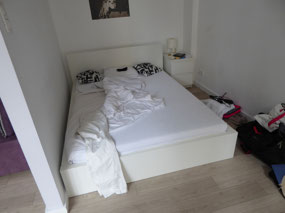
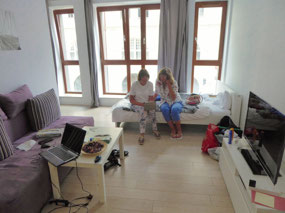
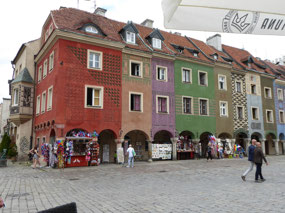
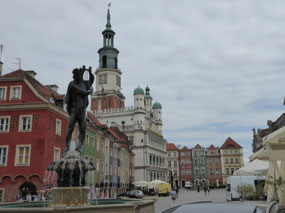
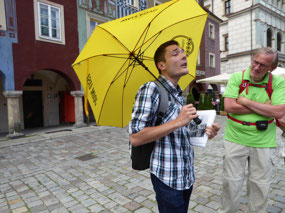



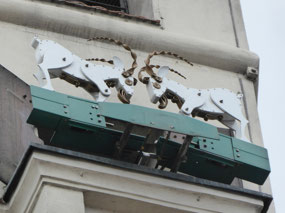
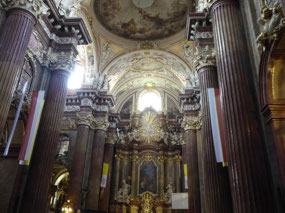
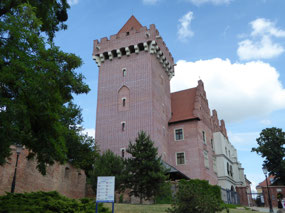
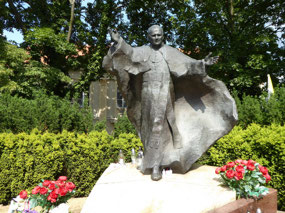
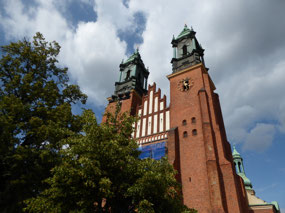
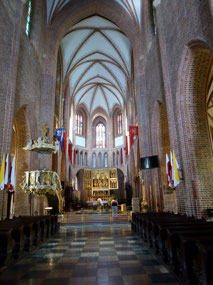
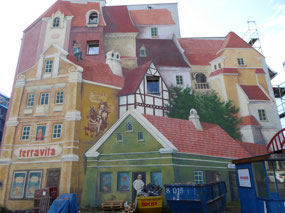
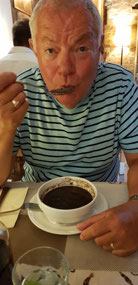
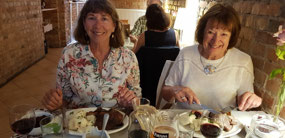
2025-05-23